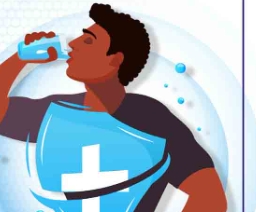Hydration is a fundamental aspect of maintaining good health, yet it is often overlooked. Water is essential for nearly every bodily function, from regulating temperature to supporting cellular processes. While many people focus on their diet and exercise routines, staying properly hydrated is just as crucial for long-term wellness. Understanding the importance of hydration and how to maintain adequate water intake can significantly enhance overall health and prevent a range of health issues.
The Role of Water in the Body
Water is the most abundant substance in the human body, accounting for about 60% of our total body weight. Every single cell in our body requires water to function properly. It plays a vital role in numerous physiological processes, including:
- Regulating Body Temperature: Water helps regulate body temperature through processes like sweating and evaporation. When we sweat, our bodies release heat, which helps cool us down during physical activity or in hot weather.
- Nutrient Transport: Water is a key component of blood, which transports oxygen and nutrients to cells throughout the body. Without adequate hydration, nutrient delivery to tissues can be impaired.
- Digestion and Detoxification: Water is crucial for digestion, helping to break down food and absorb nutrients. It also aids in the removal of waste products through urine and sweat, supporting the body’s detoxification processes.
- Joint Lubrication: Water acts as a lubricant for joints and tissues, helping to reduce friction and prevent discomfort or injury during physical activity.
- Cellular Health: Every cell in the body is surrounded by water, and proper hydration is essential for maintaining cell function and integrity. Dehydration can lead to cell shrinkage, affecting their ability to perform essential tasks.
Signs of Dehydration
Dehydration occurs when the body loses more water than it takes in. Even mild dehydration can have a negative impact on health. Common signs of dehydration include:
- Thirst
- Dry mouth and skin
- Fatigue
- Dizziness or lightheadedness
- Dark-colored urine
- Headaches
- Muscle cramps
If dehydration becomes more severe, symptoms may include confusion, rapid heart rate, fainting, and a drop in blood pressure. Severe dehydration requires immediate medical attention, as it can lead to serious complications such as kidney damage, heatstroke, or shock.
Hydration and Physical Performance
Proper hydration is particularly important for physical performance. When you exercise, you lose water through sweat, and if you don’t replace that lost fluid, it can negatively affect your strength, endurance, and recovery. Dehydration during exercise can lead to muscle cramps, dizziness, and a decrease in exercise efficiency.
Even mild dehydration can impair physical performance, so it’s essential to drink water before, during, and after exercise. The amount of water you need depends on factors like the intensity of your workout, the environment (hot or humid conditions can increase fluid loss), and your body size.
Hydration and Mental Function
Hydration doesn’t only impact your body; it also affects your mind. Studies have shown that even mild dehydration can impair cognitive functions such as concentration, memory, and mood. Dehydration can cause a decrease in attention span, slower reaction times, and difficulties with problem-solving. It may also contribute to feelings of irritability and anxiety.
In fact, research has found that dehydration can affect mental performance as much as it affects physical performance. This is why staying hydrated is essential for maintaining focus at work, school, or any task that requires mental concentration.
How Much Water Do You Need?
The amount of water each person needs can vary based on factors like age, gender, physical activity levels, climate, and overall health. While there is no one-size-fits-all answer, general recommendations suggest that:
- Men should aim for about 3.7 liters (125 ounces) of total water intake per day from all beverages and foods.
- Women should aim for about 2.7 liters (91 ounces) of total water intake per day.
These recommendations include water from all sources, including beverages like tea, coffee, and soups, as well as foods with high water content, such as fruits and vegetables.
However, it’s important to listen to your body. Thirst is a natural signal that your body needs water, and it’s essential to drink water regularly throughout the day, even if you don’t feel thirsty.
Hydration and Healthy Habits
To ensure you stay hydrated, try to make drinking water a part of your daily routine. Here are some tips for maintaining good hydration:
- Start your day with water: Drinking a glass of water as soon as you wake up can help rehydrate your body after hours of sleep.
- Carry a water bottle: Keep a water bottle with you throughout the day so that you have easy access to water whenever you feel thirsty.
- Drink before meals: Drinking a glass of water before meals can help you stay on top of your hydration and may also support digestion.
- Eat hydrating foods: Many fruits and vegetables are made up of water and can help you stay hydrated. Try adding watermelon, cucumbers, oranges, and strawberries to your meals and snacks.
- Monitor your urine color: One simple way to track your hydration level is by observing the color of your urine. Clear or light yellow urine typically indicates proper hydration, while dark yellow or amber-colored urine may signal dehydration.
The Importance of Electrolytes
While water is essential for hydration, it’s also important to maintain a balance of electrolytes in the body. Electrolytes, such as sodium, potassium, calcium, and magnesium, help regulate fluid balance, muscle function, and nerve transmission. When you sweat heavily during exercise or in hot conditions, you lose not only water but also electrolytes. This is why it’s important to replenish both fluids and electrolytes after intense physical activity.
Sports drinks, coconut water, and electrolyte-rich foods like bananas, avocados, and spinach can help restore the balance of electrolytes in your body.
Conclusion
Hydration is essential for overall health, supporting everything from physical performance to mental clarity. Water is necessary for many vital functions, including nutrient transport, temperature regulation, digestion, and joint lubrication. Staying properly hydrated can help prevent dehydration, improve your mood, and keep your body and mind functioning at their best. Remember to listen to your body’s signals, drink water throughout the day, and make hydration a part of your daily routine. By prioritizing hydration, you can enhance your overall well-being and reduce the risk of dehydration-related health issues.





